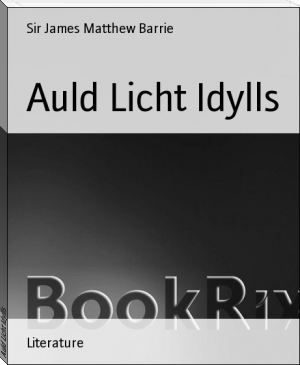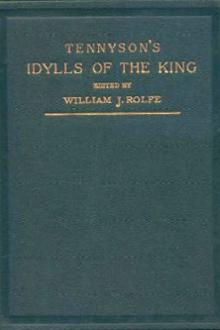Auld Licht Idylls, Sir James Matthew Barrie [different ereaders TXT] 📗

- Author: Sir James Matthew Barrie
Book online «Auld Licht Idylls, Sir James Matthew Barrie [different ereaders TXT] 📗». Author Sir James Matthew Barrie
"Tod," said Snecky, "there's some sense in that; an' what says the minister?"
"I d'na kin what he said," admitted Haggart; "but he took Little Rathie up to the manse, an' if ever I saw a man lookin' sma', it was Little Rathie when he cam oot."
The deceased had left behind him a daughter (herself now known as Little Rathie), quite capable of attending to the ramshackle "but and ben"; and I remember how she nipped off Tammas's consolations to go out and feed the hens. To the number of about twenty we assembled round the end of the house to escape the bitter wind, and here I lost the precentor, who, as an Auld Licht elder, joined the chief mourners inside. The post of distinction at a funeral is near the coffin; but it is not given to every one to be a relative of the deceased, and there is always much competition and genteelly concealed disappointment over the few open vacancies. The window of the room was decently veiled, but the mourners outside knew what was happening within, and that it was not all prayer, neither mourning. A few of the more reverent uncovered their heads at intervals; but it would be idle to deny that there was a feeling that Little Rathie's daughter was favouring Tammas and others somewhat invidiously. Indeed, Robbie Gibruth did not scruple to remark that she had made "an inauspeecious beginning." Tammas Haggart, who was melancholy when not sarcastic, though he brightened up wonderfully at funerals, reminded Robbie that disappointment is the lot of man on his earthly pilgrimage; but Haggart knew who were to be invited back after the burial to the farm, and was inclined to make much of his position. The secret would doubtless have been wormed from him had not public attention been directed into another channel. A prayer was certainly being offered up inside; but the voice was not the voice of the minister.
Lang Tammas told me afterwards that it had seemed at one time "very questionable" whether Little Rathie would be buried that day at all. The incomprehensible absence of Mr. Dishart (afterwards satisfactorily explained) had raised the unexpected question of the legality of a burial in a case where the minister had not prayed over the "corp." There had even been an indulgence in hot words, and the Reverend Alexander Kewans, a "stickit minister," but not of the Auld Licht persuasion, had withdrawn in dudgeon on hearing Tammas asked to conduct the ceremony instead of himself. But, great as Tammas was on religious questions, a pillar of the Auld Licht kirk, the Shorter Catechism at his finger-ends, a sad want of words at the very time when he needed them most, incapacitated him for prayer in public, and it was providential that Bowie proved himself a man of parts. But Tammas tells me that the wright grossly abused his position, by praying at such length that Craigiebuckle fell asleep, and the mistress had to rise and hang the pot on the fire higher up the joist, lest its contents should burn before the return from the funeral. Loury grew the sky, and more and more anxious the face of Little Rathie's daughter, and still Bowie prayed on. Had it not been for the impatience of the precentor and the grumbling of the mourners outside, there is no saying when the remains would have been lifted through the "bole," or little window.
Hearses had hardly come in at this time and the coffin was carried by the mourners on long stakes. The straggling procession of pedestrians behind wound its slow way in the waning light to the kirkyard, showing startlingly black against the dazzling snow; and it was not until the earth rattled on the coffin-lid that Little Rathie's nearest male relative seemed to remember his last mournful duty to the dead. Sidling up to the favoured mourners, he remarked casually and in the most emotionless tone he could assume: "They're expec'in ye to stap doon the length o' Little Rathie noo. Aye, aye, he's gone. Na, na, nae refoosal, Da-avit; ye was aye a guid friend till him, an' it's onything a body can do for him noo."
Though the uninvited slunk away sorrowfully, the entertainment provided at Auld Licht houses of mourning was characteristic of a stern and sober sect. They got to eat and to drink to the extent, as a rule, of a "lippy" of shortbread and a "brew" of toddy; but open Bibles lay on the table, and the eyes of each were on his neighbours to catch them transgressing, and offer up a prayer for them on the spot. Ay me! there is no Bowie nowadays to fill an absent minister's shoes.
CHAPTER XII
A LITERARY CLUB
The ministers in the town did not hold with literature. When the most notorious of the clubs met in the town-house under the presidentship of Gavin Ogilvy, who was no better than a poacher, and was troubled in his mind because writers called Pope a poet, there was frequently a wrangle over the question, Is literature necessarily immoral? It was a fighting club, and on Friday nights the few respectable, god-fearing members dandered to the town-house, as if merely curious to have another look at the building. If Lang Tammas, who was dead against letters, was in sight they wandered off, but when there were no spies abroad they slunk up the stair. The attendance was greatest on dark nights, though Gavin himself and some other characters would have marched straight to the meeting in broad daylight. Tammas Haggart, who did not think much of Milton's devil, had married a gypsy woman for an experiment, and the Coat of Many Colours did not know where his wife was. As a rule, however, the members were wild bachelors. When they married they had to settle down.
Gavin's essay on Will'um Pitt, the Father of the Taxes, led to the club's being bundled out of the town-house, where people said it should never have been allowed to meet. There was a terrible town when Tammas Haggart then disclosed the secret of Mr. Byars's supposed approval of the club. Mr. Byars was the Auld Licht minister whom Mr. Dishart succeeded, and it was well known that he had advised the authorities to grant the use of the little town-house to the club on Friday evenings. As he solemnly warned his congregation against attending the meetings the position he had taken up created talk, and Lang Tammas called at the manse with Sanders Whamond to remonstrate. The minister, however, harangued them on their sinfulness in daring to question the like of him, and they had to retire vanquished though dissatisfied. Then came the disclosures of Tammas Haggart, who was never properly secured by the Auld Lichts until Mr. Dishart took him in hand. It was Tammas who wrote anonymous letters to Mr. Byars about the scarlet woman, and, strange to say, this led to the club's being allowed to meet in the town-house. The minister, after many days, discovered who his correspondent was, and succeeded in inveigling the stone-breaker to the manse. There, with the door snibbed, he opened out on Tammas, who, after his usual manner when hard pressed, pretended to be deaf. This sudden fit of deafness so exasperated the minister that he flung a book at Tammas. The scene that followed was one that few Auld Licht manses can have witnessed. According to Tammas the book had hardly reached the floor when the minister turned white. Tammas picked up the missile. It was a Bible. The two men looked at each other. Beneath the window Mr. Byars's children were prattling. His wife was moving about in the next room, little thinking what had happened. The minister held out his hand for the Bible, but Tammas shook his head, and then Mr. Byars shrank into a chair. Finally, it was arranged that if Tammas kept the affair to himself the minister would say a good word to the Bailie about the literary club. After that the stone-breaker used to go from house to house, twisting his mouth to the side and remarking that he could tell such a tale of Mr. Byars as would lead to a split in the kirk. When the town-house was locked on the club Tammas spoke out, but though the scandal ran from door to door, as I have seen a pig in a fluster do, the minister did not lose his place. Tammas preserved the Bible, and showed it complacently to visitors as the present he got from Mr. Byars. The minister knew this, and it turned his temper sour. Tammas's proud moments, after that, were when he passed the minister.
Driven from the town-house, literature found a table with forms round it in a tavern hard by, where the club, lopped of its most respectable members, kept the blinds down and talked openly of Shakspeare. It was a low-roofed room, with pieces of lime hanging from the ceiling and peeling walls. The floor had a slope that tended to fling the debater forward, and its boards, lying loose on an uneven foundation, rose and looked at you as you crossed the room. In winter, when the meetings were held regularly every fortnight, a fire of peat, sod, and dross lit up the curious company who sat round the table shaking their heads over Shelley's mysticism, or requiring to be called to order because they would not wait their turn to deny an essayist's assertion that Berkeley's style was superior to David Hume's. Davit Hume, they said, and Watty Scott. Burns was simply referred to as Rob or Robbie.
There was little drinking at these meetings, for the members knew what they were talking about, and your mind had to gallop to keep up with the flow of reasoning. Thrums is rather a remarkable town. There are scores and scores of houses in it that have sent their sons to college (by what a struggle!), some to make their way to the front in their professions, and others, perhaps, despite their broadcloth, never to be a patch on their parents. In that literary club there were men of a reading so wide and catholic that it might put some graduates of the universities to shame, and of an intellect so keen that had it not had a crook in it their fame would have crossed the county. Most of them had but a thread-bare existence, for you weave slowly with a Wordsworth open before you, and some were strange Bohemians (which does not do in Thrums), yet others wandered into the world and compelled it to recognize them. There is a London barrister whose father belonged to the club. Not many years ago a man died on the staff of the _Times_, who, when he was a weaver near Thrums, was one of the club's prominent members. He taught himself shorthand by the light of a cruizey, and got a post on a Perth paper, afterwards on the _Scotsman_ and the _Witness_, and finally on the





Comments (0)